Table of Contents
Understanding the Impact of the Updated Schedule M on Pharmaceutical Manufacturing Standards
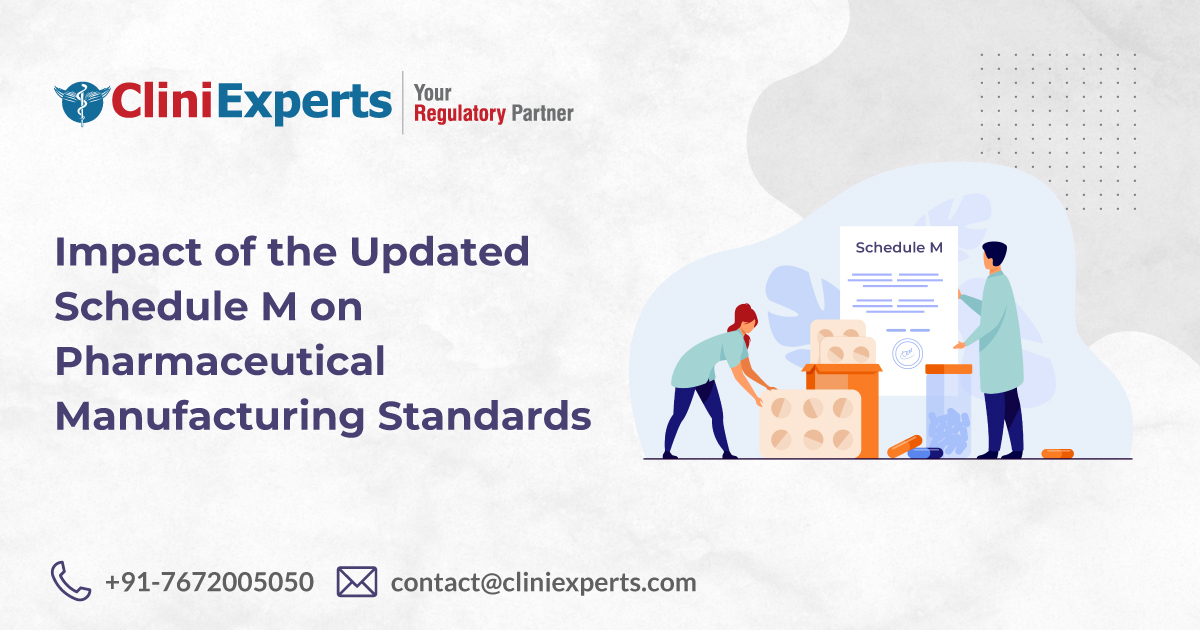
Short Description
In an effort to bring the nation’s pharmaceutical and biopharmaceutical quality standards up to par with those of other countries, the Union Health Ministry has notified the public of the revised Schedule M norms for good manufacturing practices and requirements of premises, plant, and equipment for pharmaceutical products.
Short Summary
- Schedule M was introduced in 1988 as a part of the Drugs and Cosmetics Act, 1945.
- On 28th December 2023, the Ministry of Health and Family Welfare released updated regulations under Schedule M of the Drugs and Cosmetics Rules, 1945.
- Revised changes in Schedule M include the incorporation of a pharmaceutical quality system, quality risk management, product quality review, qualification and validation, and implementation of a computerized storage system
Overview
As per the notice dated 28th December 2023, the Ministry of Health and Family Welfare (MoHFW) has released updated regulations under Schedule M of The Drugs and Cosmetics Rules, 1945, marking a major step toward improving adherence to quality standards.
These regulations, which include the good manufacturing practices (GMP) for pharmaceuticals, are intended to change the way that pharmaceuticals are made in India.
Key changes in the Revised Schedule M
Schedule M, incorporated as a part of the Drugs and Cosmetics Act in 1988, helped to set foundational standards for the manufacturing quality of pharmaceutical products. The revised Schedule M includes five more categories to ensure compliance with global standards, as follows:
- Pharmaceutical quality system (PQS)
- Quality risk management (QRM)
- Product quality review (PQR)
- Qualification and validation
- Implementation of a computerized storage system
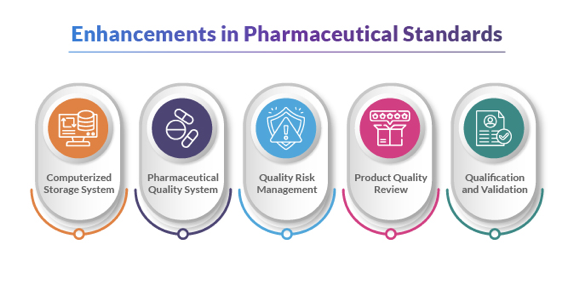
Fig 1: Enhancements in Pharmaceutical Standards
The key aspects of the proposed amendments include the change of the terminology “Good Manufacturing Practices” in Rule 74 (clause o), Rule 76 (clause 8), and Rule 78 (clause p) to “Good Manufacturing Practices and Requirements of Premises, Plant and Equipment for Pharmaceutical Products.”
Pharmaceutical Quality System
In order to guarantee that pharmaceutical products are safe for the intended purpose, meet license criteria, and do not endanger patients through subpar safety, quality, or efficacy, the producer has the responsibility for the products’ quality. Senior management bears the responsibility for achieving this quality target, which relies on the involvement and dedication of employees across all departments and levels of the business, as well as suppliers and distributors.
Quality Risk Management
Quality risk management is a methodical approach to the assessment, management, review, and communication of risks to the pharmaceutical product’s quality.
Quality Risk Management is to guarantee that:
- The risk to quality is evaluated using scientific knowledge and experience with the procedure, and that it ultimately relates to patient protection; and
- The degree of formality, effort, and documentation of the quality risk management process is commensurate with the degree of the risk
Product Quality Review
Regular, periodic, or rolling quality reviews of all pharmaceutical products (typically done once a year), including those intended solely for export, must be carried out in order to identify areas for improvement in both the finished product and starting materials specifications, as well as to confirm that the current process is consistent and appropriate.
Qualification and Validation
The purpose of qualification and validation is to prove, through documentation, that:
- The buildings, processes, equipment, and supporting utilities have been designed in compliance with good manufacturing practices requirements
- The buildings, processes, and equipment have been constructed and installed in accordance with their design specifications
- The buildings, supporting utilities, and equipment function as intended
- A particular process will reliably yield a product that satisfies its predetermined specifications and quality attributes
Computerised Storage System
Computerized systems must have enough controls in place to stop unauthorized users from accessing or altering data. Furthermore, controls must be in place to avoid data omissions (such as when the system is turned off and no data is recorded). Every modification to data must be documented, including with the prior entry, the person making the change, the date it was done, and the details. To ensure that records are never permanently lost as a result of system failure or breakdown, a backup solution must be offered. Every computerized system must have set methods for guaranteeing data safety.
Implementation Timeline
Manufacturers were divided into 2 categories (large manufacturers and small manufacturers) based on their turnover. On 28th December 2023, the Health Ministry of India announced the deadlines for manufacturers to meet the new manufacturing standards, as follows:
| Manufacturers | Old Timeline for implementation |
| Large manufacturers (Turnover >250 crores) | 6 months from the date of publication of rules (28th June, 2024) |
| Small manufacturers (Turnover <250 crores) | 12 months from the date of publication of rules (31st December 2024) |
The revised Schedule M requirements have been implemented for large manufacturers with effect from 28th June, 2024.
However, on 12th February 2025, the Health Ministry of India announced that small and medium-sized manufacturing units (MSMEs) now have one more year to meet new manufacturing standards. The Ministry did not agree to extend the deadline further or remove any conditions requested by MSMEs.
The new rules, published in February 2025, extend the MSME compliance deadline for updated manufacturing standards to December 31, 2025. The extension will apply only to those who submit an application within three months.
| Small and Medium-Sized Manufacturing Units | New Implementation Timeline |
| Only on the application for an extension (Submission of a plan for upgradation in Form A to the Central License Authority) within 3 months from 11th February 2025 (11th May, 2025) | 31st December, 2025 |
Impact of the Revised Schedule M
Compliance with the revised Schedule M guidelines has the following benefits:
- Ensures hygiene, proper equipment, and best practices for safe, effective medications.
- Reduces contamination, cross-contamination, and human errors.
- Compliance with global standards boosts international market access.
Overall, compliance with the revised Schedule M guidelines helps to elevate the quality and safety of pharmaceutical products.
Conclusion
The revised version of Schedule M focuses more on GMP, with particular emphasis on environmental controls, validation processes, quality assurance, and documentation practices. These changes help India’s pharmaceutical industry align more closely with international regulations, thus improving the quality of pharmaceutical products.
| Original Schedule M | Revised Schedule M | |
| Implementation | Implemented in 1988 | Implemented in December 2023 |
| Features | Helped to set foundational standards for the manufacturing quality of pharmaceutical products. It did not dig deep into the details necessary to ensure the good manufacturing practices of these products. | Introduced key modifications including: Pharmaceutical quality system Quality risk management Product quality review Qualification and Validation Implementation of a computerized storage system |
| Deadlines to meet new manufacturing standards | Large Manufacturers: 28th June, 2024 Small and Medium-sized manufacturing units (MSMEs): 31st December, 2025 Application for extension of deadline for MSMEs: 11th May, 2025 |
Saurangi is a food regulatory expert with 8 years of experience. She shares her knowledge and insights on regulatory updates, food trends, best practices, and news. Follow her for expert insights and practical advice on all things for food regulatory
Saurangi Shah
CliniExperts Services Pvt. Ltd.
Recent Posts
Organic Food Labelling In India| Certification, and Import of Organic Food in India
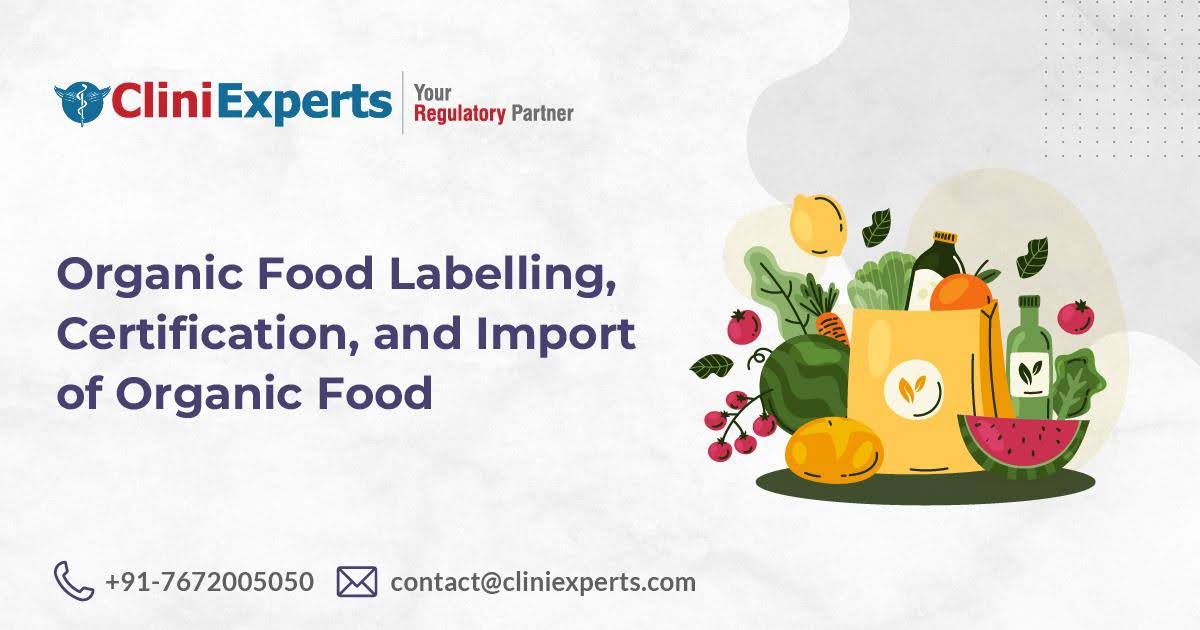
This Article is All About Organic Food Labelling In India and Certification, and Import of Organic Food in India. Explained in Detail About What is Organic Food labelling? Summary Short Description Wi..
Cosmetic Label Compliance India : A Guide to Compliance
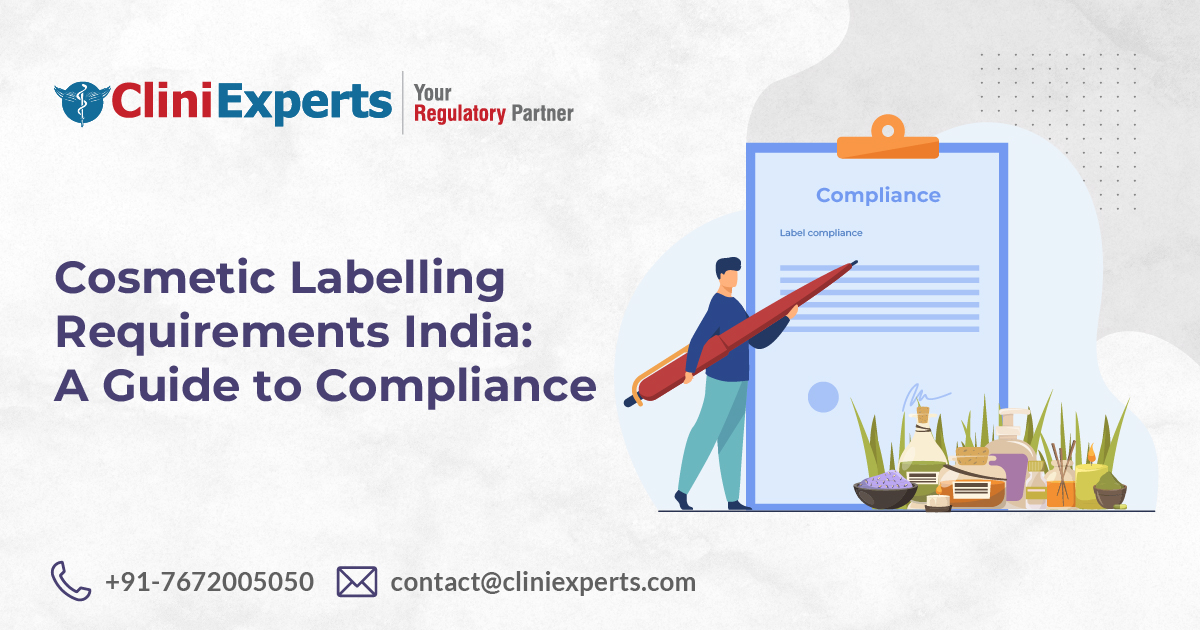
Introduction Looking for Cosmetic Label Compliance India? Are you a cosmetic manufacturer or importer navigating the complex world of Indian regulations? Ensuring your product labels comply with the l..
Clinical Investigation Approvals: An Overview of Forms MD-22 and MD-23
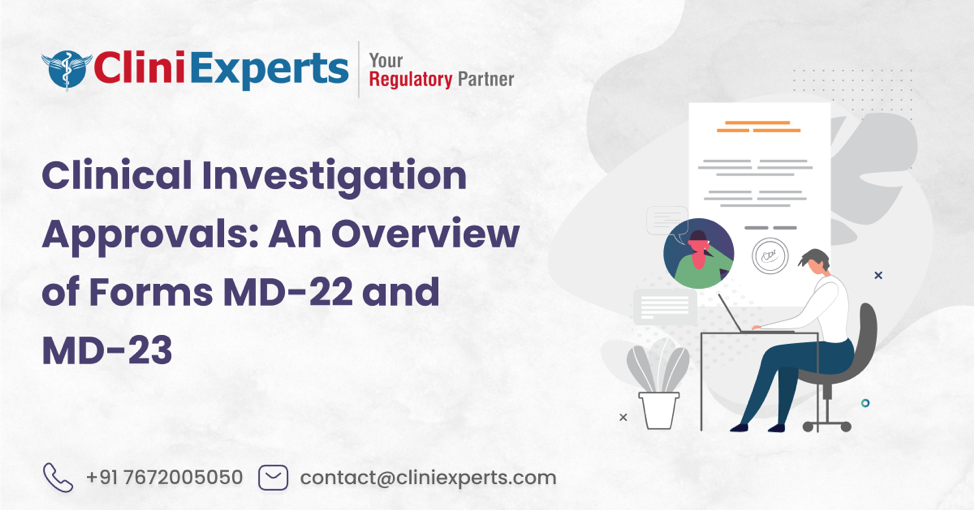
Summary Short Description Strict regulatory protocols govern clinical investigations for medical devices. Central to this process are forms MD-22 and MD-23. Form MD-22 is an application to Central Lic..
HAVE A QUERY?
REACH US!Office
New Delhi
Unit No. 324 & 325, City Centre Mall, Plot No. 5, Sector 12, Dwarka, India - 110075
+917672005050
Bengaluru
RMZ Galleria, 1st floor, Ambedkar Colony, Yelahanka, Bengaluru, Karnataka, India – 560064
Call us on
Sales: +91 7672005050
Reception: +91-11-45214546
Timings
9 am to 6 pm (Monday to Friday)


